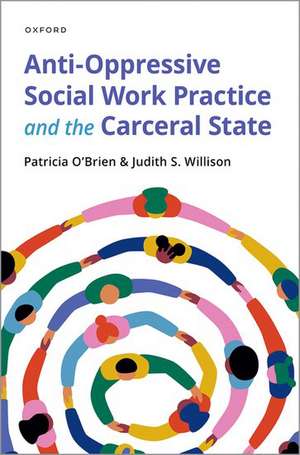Anti-Oppressive Social Work Practice and the Carceral State
Autor Patricia O'Brien, Judith S. Willisonen Limba Engleză Paperback – 13 oct 2022
Preț: 451.73 lei
Nou
Puncte Express: 678
Preț estimativ în valută:
86.47€ • 93.95$ • 72.68£
86.47€ • 93.95$ • 72.68£
Carte disponibilă
Livrare economică 31 martie-14 aprilie
Preluare comenzi: 021 569.72.76
Specificații
ISBN-13: 9780190076757
ISBN-10: 0190076755
Pagini: 304
Dimensiuni: 236 x 155 x 16 mm
Greutate: 0.45 kg
Editura: Oxford University Press
Colecția OUP USA
Locul publicării:New York, United States
ISBN-10: 0190076755
Pagini: 304
Dimensiuni: 236 x 155 x 16 mm
Greutate: 0.45 kg
Editura: Oxford University Press
Colecția OUP USA
Locul publicării:New York, United States
Recenzii
Anti-oppressive Social Work Practice and the Carceral State is a contribution that fills a significant gap. Increasingly there are calls for anti-oppressive social work, particularly related to carceral systems, and this book provides language and context. O'Brien and Willison have created a text for those who are new to the topic to begin to understand the important issues, and for someone who is familiar, to expand their knowledge. Anyone interested in anti-oppression should add this resource to their library.
It's not easy to find space for anti-oppressive frameworks in a place that is created for and animated by oppression. And yet this space is in deep need of both humanity, for those who are currently locked in, and disassembled. O'Brien and Willison attend to both sides of this spectrum with wisdom, strategies for anti-oppressive social work practice, and some of the most important ethical considerations for this period in social work. The books attention to practice and ethics makes it invaluable to students and practitioners.
The social work profession is at a critical point where we must question our role in maintaining the carceral state and the conflicts this creates with our professed values. Anti-Oppressive Social Work Practice and the Carceral State raises the important questions we must consider and provides some paths forward. If the profession does not address the questions raised in this important text, it risks moving towards irrelevancy.
Anti-Oppressive Social Work Practice and the Carceral State delivers fully and dynamically on its stated promises. Patricia O'Brien and Judith Willison offer a creative and timely book that greatly expands the reader's grasp of the U.S. carceral state as a whole and as a set of parts. The contours and mechanisms of Its operations and unjust aspects are clearly illuminated through illustrations from the reports of people caught up in the bowels of the carceral state and from the reflections of experienced social work practitioners.
Anti-Oppressive Social Work Practice and the Carceral State stands out as a timely and practical book.
Despite the many differences between American and Czech prison system, the book offers thought-provoking reflections especially for social workers and community-oriented workers. I must also highlight the intersectional approach of the authors, who throughout the book in virtually all respects emphasize the complex relationships and unequal positions of the various actors in every aspect of the book, without resorting to economic or cultural reductionism. However some of the ideas in the book may be considered radical, the authors offer convincing arguments based on concrete data and research, and more importantly, on problems they describe, they offer very concrete and practical solutions.
It's not easy to find space for anti-oppressive frameworks in a place that is created for and animated by oppression. And yet this space is in deep need of both humanity, for those who are currently locked in, and disassembled. O'Brien and Willison attend to both sides of this spectrum with wisdom, strategies for anti-oppressive social work practice, and some of the most important ethical considerations for this period in social work. The books attention to practice and ethics makes it invaluable to students and practitioners.
The social work profession is at a critical point where we must question our role in maintaining the carceral state and the conflicts this creates with our professed values. Anti-Oppressive Social Work Practice and the Carceral State raises the important questions we must consider and provides some paths forward. If the profession does not address the questions raised in this important text, it risks moving towards irrelevancy.
Anti-Oppressive Social Work Practice and the Carceral State delivers fully and dynamically on its stated promises. Patricia O'Brien and Judith Willison offer a creative and timely book that greatly expands the reader's grasp of the U.S. carceral state as a whole and as a set of parts. The contours and mechanisms of Its operations and unjust aspects are clearly illuminated through illustrations from the reports of people caught up in the bowels of the carceral state and from the reflections of experienced social work practitioners.
Anti-Oppressive Social Work Practice and the Carceral State stands out as a timely and practical book.
Despite the many differences between American and Czech prison system, the book offers thought-provoking reflections especially for social workers and community-oriented workers. I must also highlight the intersectional approach of the authors, who throughout the book in virtually all respects emphasize the complex relationships and unequal positions of the various actors in every aspect of the book, without resorting to economic or cultural reductionism. However some of the ideas in the book may be considered radical, the authors offer convincing arguments based on concrete data and research, and more importantly, on problems they describe, they offer very concrete and practical solutions.
Notă biografică
Patricia O'Brien, PhD, MSW, is Associate Professor (retired) at the Jane Addams College of Social Work at the University of Illinois at Chicago (UIC). Nationally known for her advocacy and research on women in and out of prison, she published one of the first studies examining how women succeed in the community after release from incarceration.Judith S. Willison, PhD, MSW, LICSW, is Associate Professor in the Bridgewater State University School of Social Work. Her scholarship focuses on understanding the place of criminalized behavior within existing systems of social inequity and institutionalized white supremacy to support activist interventions.
